Plastic surgery addiction: causes, signs, and treatments
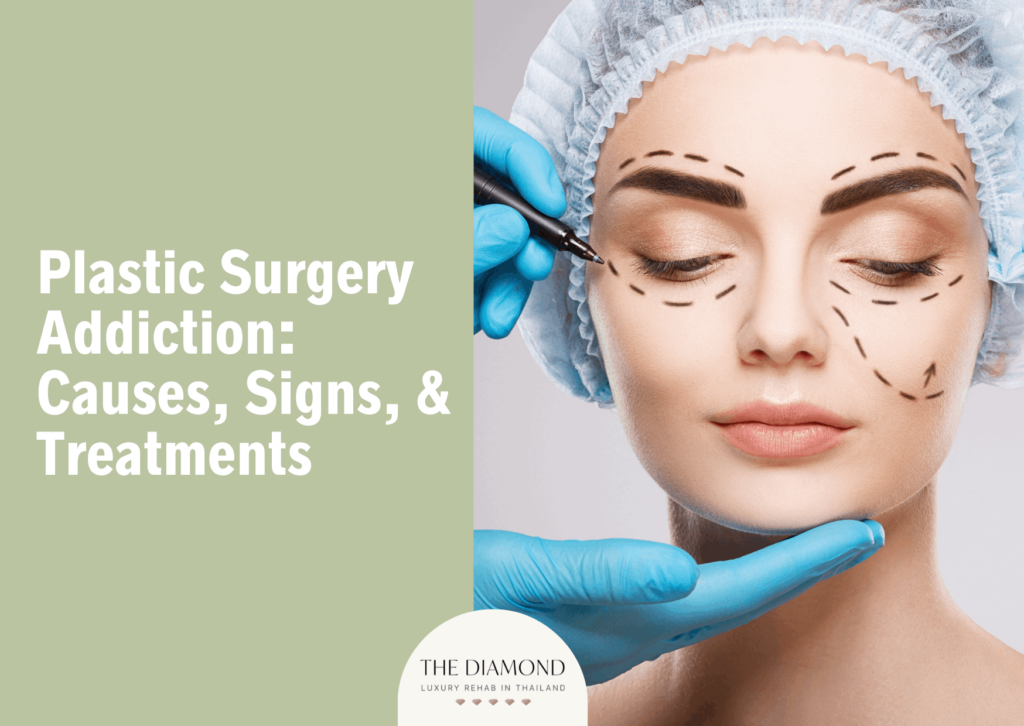
Plastic surgery is a medical procedure that involves the restoration or improvement of function for various parts of the body. Millions of cosmetic procedures are done each year, and these surgeries are also being increasingly normalized around social media. But where do we draw the line between just wanting to gain self-confidence and an overwhelming need for perfection?
Plastic surgery addiction occurs when a person develops an obsession with changing or improving their appearance by repeatedly undergoing surgeries. Although it is not officially recognized as a diagnosable disorder – as is the case with other various behavioral conditions – there is no mistake that it can still have adverse effects on your physical, mental, and social health.
What is plastic surgery?
Plastic surgery is a type of procedure that is concerned with the reconstruction or improvement of the form or function of various parts of the body. These deformities in the human body may be due to congenital defects, trauma, infection, burns, or disease.
Plastic surgery encompasses both reconstructive and cosmetic procedures, which means it can also be used to enhance the appearance of a rather healthy person prior to the surgery. In some cases, however, this becomes a problem for some people who go on to develop surgical addiction.
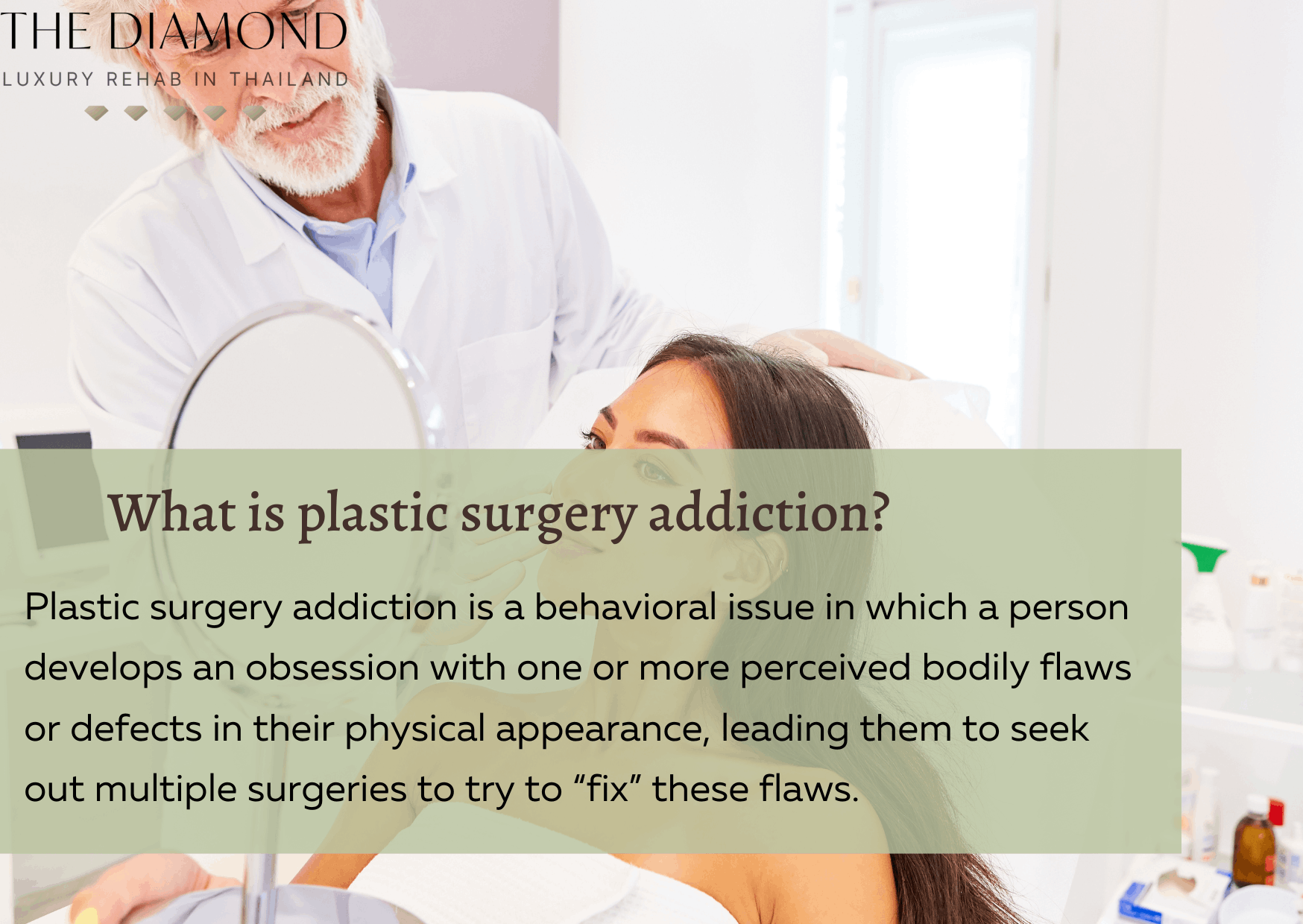
What is plastic surgery addiction?
Plastic surgery addiction is a behavioral issue in which a person develops an obsession with one or more perceived bodily flaws or defects in their physical appearance, leading them to seek out multiple surgeries to try to “fix” these flaws.
Someone who is addicted to surgery may constantly worry about a body part they perceive to be flawed, which could actually only be a slight imperfection or event nonexistent in reality. Plastic surgery addiction is believed to have a strong connection with body dysmorphic disorder or BDD, a mental health condition that is characterized by an excessive preoccupation with perceived negative features in one’s appearance.
What are the causes of plastic surgery addiction?
The mental picture we have of ourselves is heavily influenced by both internal and external factors. The causes of plastic surgery addiction are listed below.
- Childhood trauma: Survivors of childhood trauma tend to focus their attention on their distorted perception of themselves. This results in impairments in self-reported body image, which puts them at a greater risk for surgery addiction later in life.
- School bullying: Being bullied results in poor psychological functioning, which could lead to an increased desire for cosmetic surgery. Bullying victims tend to be more interested in having cosmetic surgery in order to fix their perceived flaws. However, a study published in the American Society of Plastic Surgeons (ASPS) shows that even perpetrators of bullying also have a desire for plastic surgery, but this time as a way to increase their social status.
- Body dysmorphic disorder: this behavioral issue often co-occurs with plastic surgery addiction. Individuals with body dysmorphic disorder (BDD) intensely focus on a bodily feature that they perceive to be flawed, which causes them to develop unwanted repetitive behaviors, such as looking in the mirror for many hours a day to fix or hide their negative features. Needless to say, these unhealthy habits can cause significant distress and impairment in a person’s daily functioning. An article published in the Aesthetic Surgery Journal states that according to studies, five to 15% of individuals who seek to undergo plastic surgery suffer from BDD.
What are the risks associated with plastic surgery addiction?
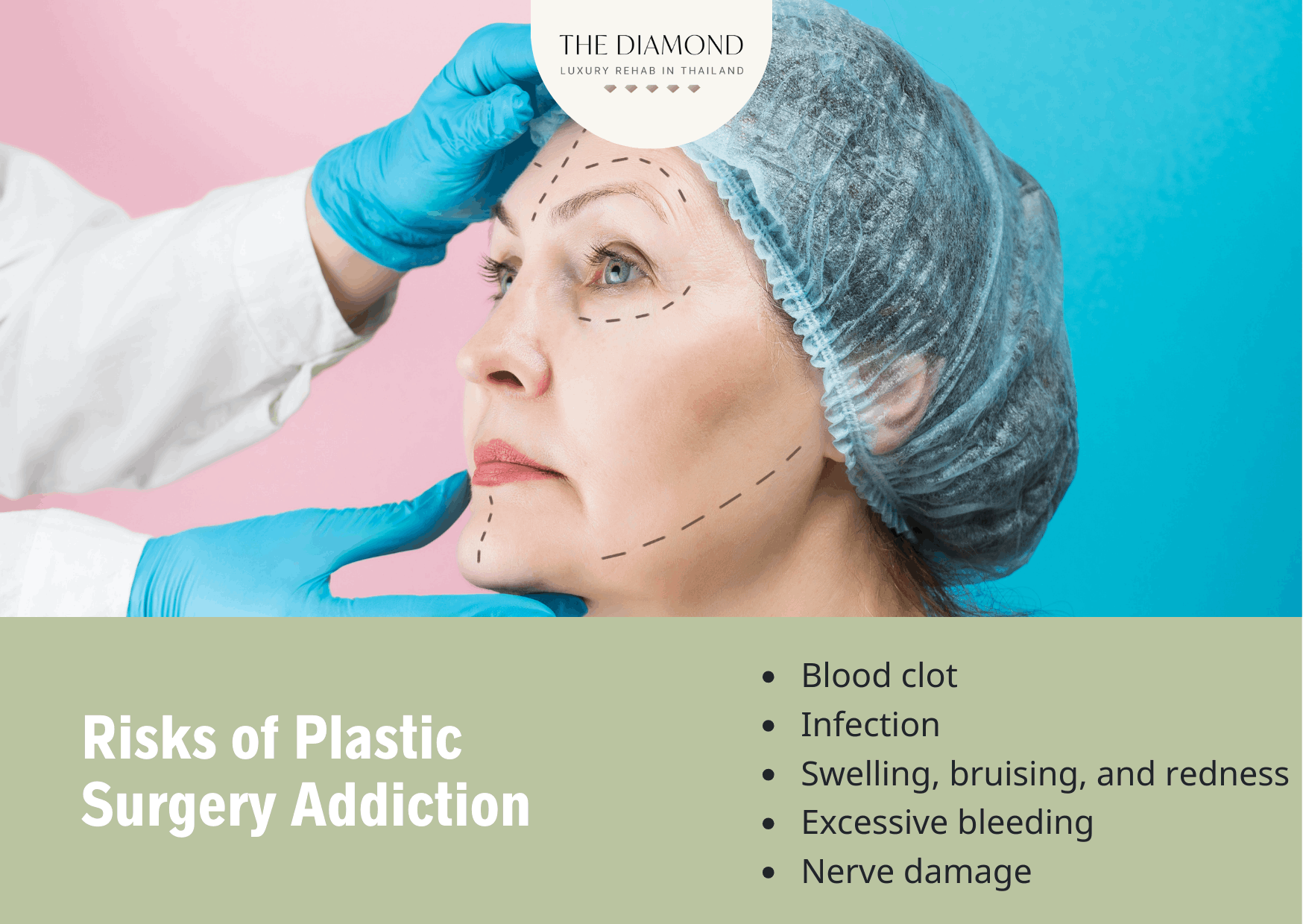
Addiction to plastic surgery can pose serious dangers to your physical, mental, and social health. The risks associated with plastic surgery addiction are listed below.
- Blood clot: Blood clot formation is a risk of cosmetic surgical procedures that can continue during the recovery period due to injury or trauma to the blood vessels during an operation.
- Infection: one of the most common plastic surgery complications. A cut through the skin made during surgery puts you at risk for surgical wound infections. This opening made through an incision becomes an entry point for bacteria during and after the procedure.
- Swelling, bruising, and redness: are some unfortunate occurrences within one to two weeks of the surgical procedure. Almost every surgery or invasive procedure will lead to some amount of swelling, bruising, and redness that can last anywhere between three and five days or several weeks.
- Excessive bleeding: While an opening in the skin done with any procedure typically puts you at risk for bleeding due to damage to the skin and tissue, excessive bleeding can create major complications. Continued bleeding can result in blood accumulating under the skin, which may require an additional surgery.
- Nerve damage: The risk of nerve damage is present in any type of surgical procedure. Disruptions in nerve endings that occur during an operation can cause numbness, tingling sensations, and muscle weakness after surgery.
- Poor reactions to anesthesia: Anesthesia-related complications in reconstructive and cosmetic surgeries are rare, but can potentially be fatal when they occur. Individuals who react badly to anesthesia may experience various symptoms ranging from mild to severe, including nausea, vomiting, acute blood loss, allergy, shock, cardiac arrest, and even death.
- Financial problems: Plastic surgeries cost a lot of money and are rarely covered by insurance. As with any other forms of addiction, repeatedly going under the knife to fuel an afflicted person’s plastic surgery addiction can cause financial ruin in no time.
- Exacerbation of mental health concerns: A surgery addict may worsen already existing mental health conditions, including but not limited to body dysmorphic disorder, eating disorders, depression, and anxiety disorders. As plastic surgery doesn’t really solve the underlying psychological issues that are causing them to not fully feel satisfied with their appearance, they end up feeling worse and with a lower self-worth.
What are the signs of plastic surgery addiction?
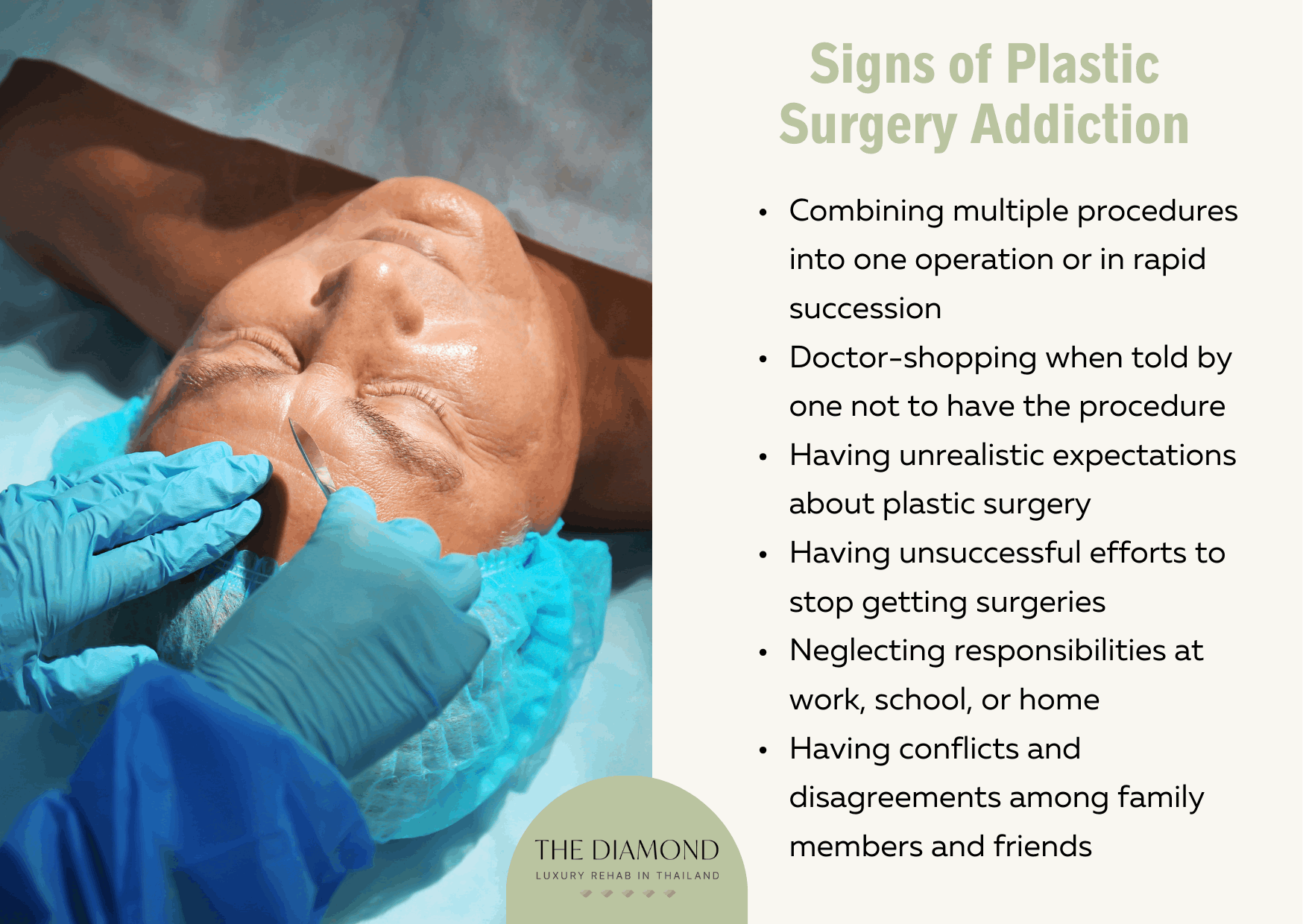
People who suffer from behavioral disorder may show noticeable changes in their personality or behavior. The most common signs of plastic surgery addiction are listed below.
- Combining multiple procedures into one operation or in rapid succession: Someone with a cosmetic surgery addiction may have a list of body parts they would want to improve on a continuous basis. This can lead them to have multiple plastic surgeries performed at the same time. Even though this may be allowed in some cases, someone who wants to get more procedures may resort to plastic surgeons without proper credentials.
- Doctor-shopping when told by one not to have the procedure: Surgery addicts may be told by one doctor that they are not healthy enough to consider having plastic surgery. In which case, they have a tendency to go to other doctors to find someone who will do the procedure
- Having unrealistic expectations about plastic surgery: A plastic surgery addict often has unrealistic expectations about how the procedure will turn out or how it will make them feel afterwards. Most of the time, these expectations are not met, and this results in disappointment when they think the surgery has not turned out as they thought it would. This ultimately leads to a desire for more revisions to their body.
- Having unsuccessful efforts to stop getting surgeries: At some point, you may promise yourself or others that you are going to control your obsession with cosmetic surgery, but to no avail. Each time, you also go back on your word and still continue getting surgeries to “fix” minor or even nonexistent flaws.
- Neglecting responsibilities at work, school, or home: When thoughts about which procedure to have next and recovering from multiple surgeries start to take over your life, you will begin to forego responsibilities at your job, school, and home.
- Having conflicts and disagreements among family members and friends: Behavioral disorders such as plastic surgery addiction do not only affect the afflicted person, but its impact also extends to the addict’s loved ones. Over time, such behavioral difficulties can hurt friends and family members by causing financial hardship or even bankruptcy.
What are the possible treatments for plastic surgery addiction?
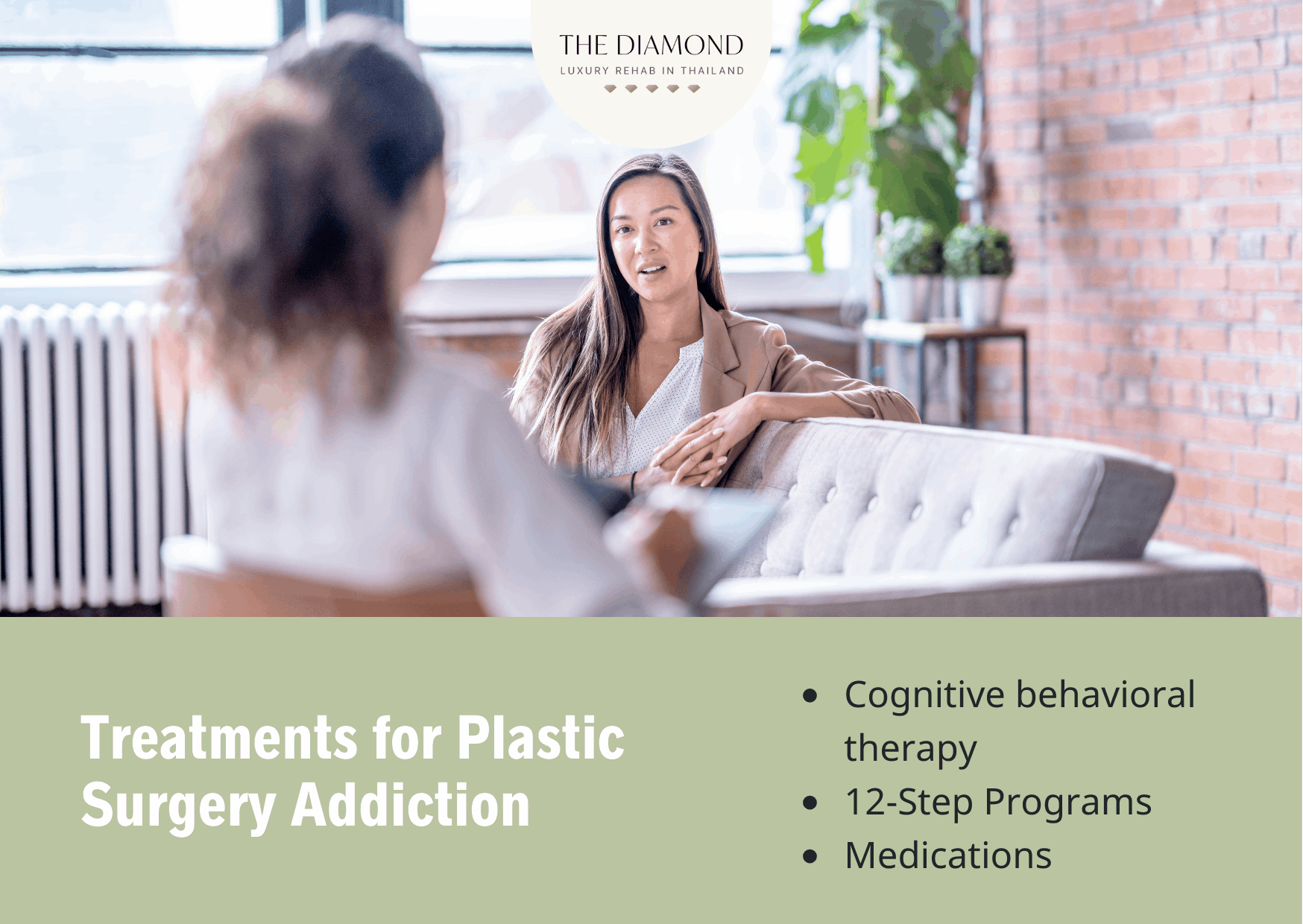
While some may think that surgery offers a quick fix for their body image issues, it can typically have the opposite effect, and their anxieties will only transfer to another part of their body they think is flawed. In other words, cosmetic surgery does not get to the root of the problem. The possible treatments for plastic surgery addiction are listed below:
- Cognitive behavioral therapy: Cognitive behavioral therapy (CBT) helps someone with surgery addiction disorder see how their thoughts, feelings, and behaviors all interact together to shape their actions. CBT involves identifying and challenging distorted thought patterns that may contribute to addictive behaviors around cosmetic surgeries. When these unhelpful ways of thinking are replaced with positive and more realistic thoughts, one can be more ready to face the urge of getting another surgery, ultimately leading to an improved quality of life.
- 12-Step Programs: A mental health professional may also recommend joining a 12-step program to build a recovery support network. 12-step support groups provide a safe space for individuals struggling with any kind of addiction, where they can share their struggles and help one another achieve and maintain control over unhealthy habits.
- Medications: There are no specific medications approved by the U.S. Food and Drug Administration (FDA) to treat cosmetic addiction. However, in some cases where co-occurring mental health conditions, such as anxiety, depression, and body dysmorphic disorder exist, antidepressants could help reduce anxiety symptoms and compulsive behaviors that may contribute to the disorder.
How common is plastic surgery addiction?
As of writing, there is no way to know how common plastic surgery addiction is because it is not yet recognized as a diagnosable condition in the DSM-5. It is worth noting, however, that body dysmorphic disorder, the psychological condition that often causes someone to be addicted to plastic surgery, affects about 1 in 50 people, or an estimated five to ten million people in the United States, the Cleveland Clinic states.
It is widely believed that actual numbers could be larger than these because people with BDD may be reluctant to talk about their symptoms and seek treatment for their condition.
How does plastic surgery affect mental health?
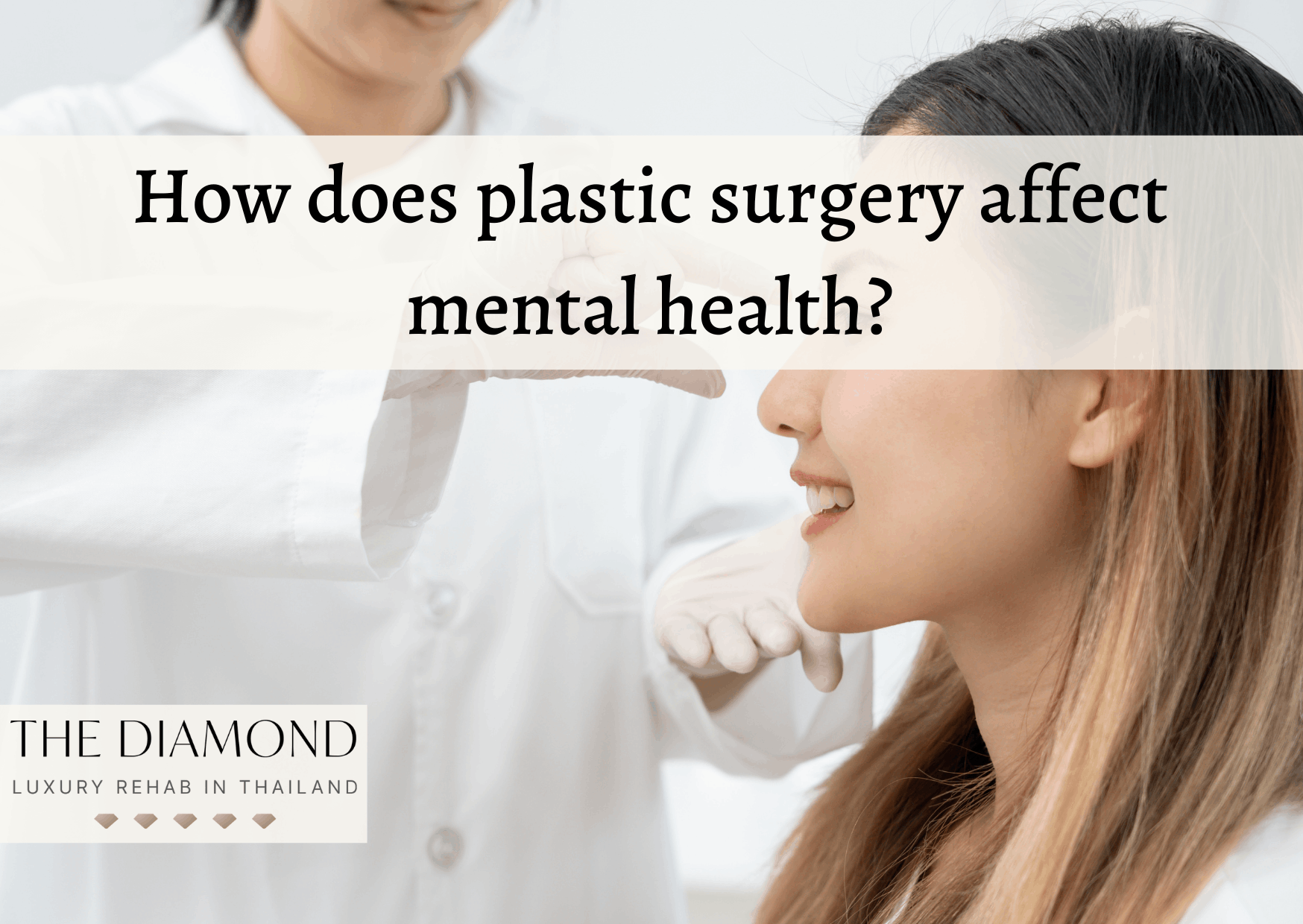
Plastic surgery affects mental health in many ways – frequently undesirable ones. While plastic surgery is initially done to help people regain their self-esteem, several studies have found that this may not always be the case.
In fact, a study published in the Archives of Plastic Surgery suggests that there is an increased risk of suicide among women who had received cosmetic breast augmentation surgery. Furthermore, high rates of body dysmorphic disorder and other associated psychiatric comorbidities, including borderline, paranoid, and obsessive-compulsive personality disorders are also observed in patients with plastic surgery obsessions.
Can body dysmorphia be brought on by plastic surgery?
No, body dysmorphia cannot be brought on by plastic surgery, even though there is a strong connection between the two. Body dysmorphic disorder is included in the obsessive-compulsive and related disorders spectrum in the Diagnostic and Statistical Manual of Mental Disorders, Fifth Edition, (DSM-5) by the American Psychiatric Association. Although the condition does not have a single cause and is instead a result of a combination of issues, plastic surgery is not one of them.
It is worth noting, however, that some causes of BDD, including low self-esteem, bullying, and teasing, can also be major risk factors for developing plastic surgery addiction. But in most cases, seeking unnecessary cosmetic procedures among plastic surgery addicts is often a result of body dysmorphia, and not the other way around.

